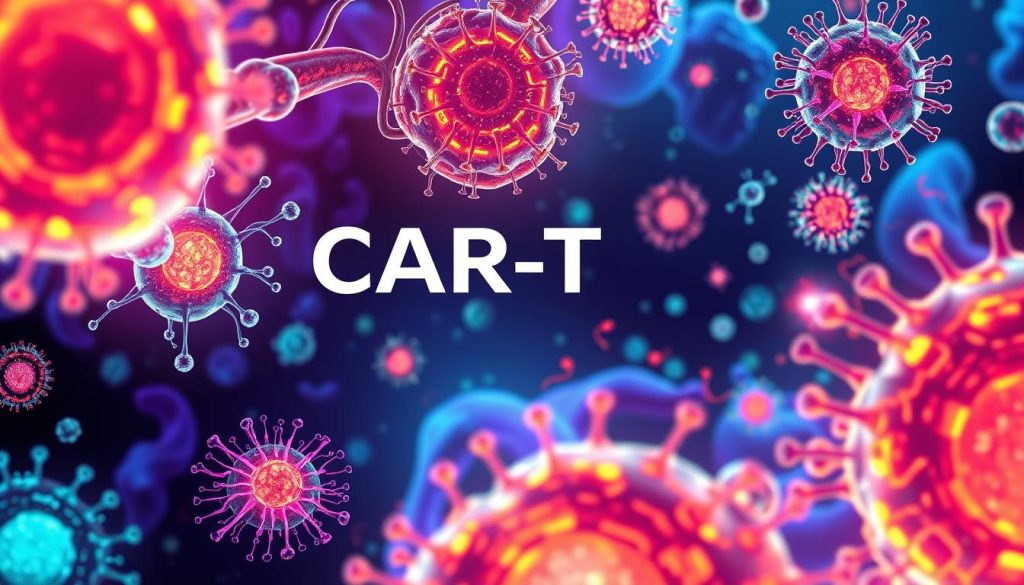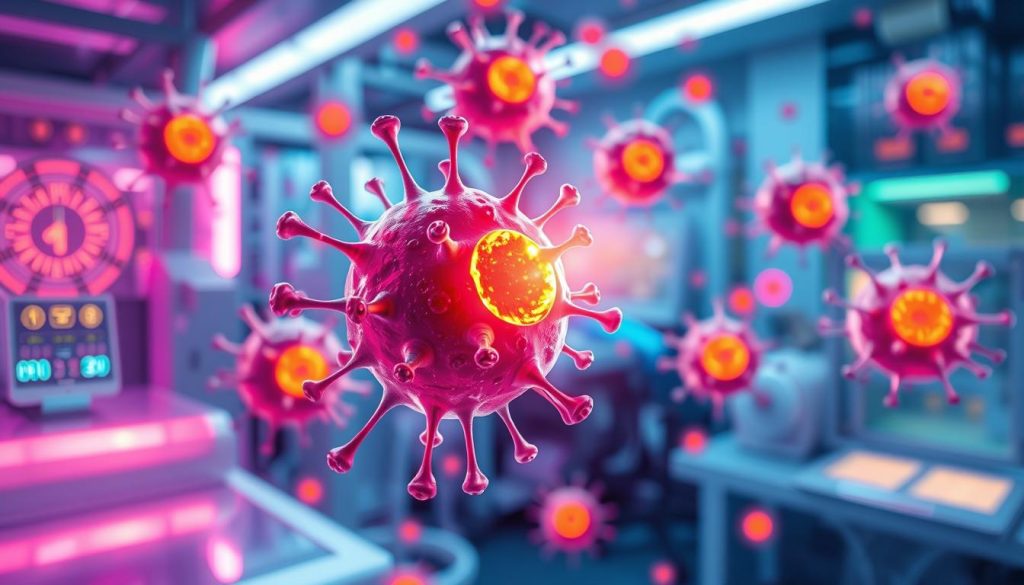CAR-T cell therapy is a new way to fight cancer. It uses the body’s immune system to attack cancer cells. This treatment is made just for each patient, making it very personal.
This therapy changes a patient’s T cells to find and kill cancer cells. Scientists make these T cells strong by adding special receptors. This way, they can target and destroy cancer cells very well.
In this guide, we’ll explore CAR-T cell therapy in detail. We’ll look at its history, how it works, and what cancers it treats. We’ll also talk about who can get it, the treatment process, side effects, and long-term results.
As research grows, CAR-T cell therapy is becoming more promising. It’s changing the lives of cancer patients and their families. Let’s learn more about this groundbreaking treatment.
Introduction to CAR-T Cell Therapy
CAR-T cell therapy is a new way to fight cancer. It uses the body’s immune system to attack cancer cells. This is a big hope for people who have tried other treatments without success.
Definition of CAR-T Cell Therapy
CAR-T stands for Chimeric Antigen Receptor T-cell. It’s a kind of adoptive cell transfer therapy. It changes a patient’s T-cells to find and kill cancer cells. Then, these T-cells are put back into the patient to fight the cancer.
Brief History of CAR-T Cell Therapy Development
The journey of CAR-T cell therapy is amazing. It has taken many years of hard work and discovery. Here are some important moments:
| Year | Milestone |
|---|---|
| 1989 | First CAR-T cells developed in a lab |
| 2010 | First successful use of CAR-T in a patient |
| 2017 | FDA approves first CAR-T therapies (Kymriah and Yescarta) |
| 2020-2021 | Additional CAR-T therapies approved (Tecartus and Breyanzi) |
Scientists are always looking to make CAR-T cell therapy better. They want to use it for more cancers and make it easier to get. This is all part of making targeted cancer immunotherapy even more effective.
How CAR-T Cell Therapy Works
CAR-T cell therapy is a new way to fight cancer. It uses the body’s immune system to attack cancer cells. This method involves several steps to make T-cells target cancer.
T-Cell Extraction and Modification
The first step is to take T-cells from the patient. These cells are important for fighting off infections. They are then sent to a lab for genetic changes.
In the lab, scientists add a gene to the T-cells. This gene makes them recognize cancer cells.

Chimeric Antigen Receptors (CARs) Explained
Chimeric antigen receptors, or CARs, are special proteins. They help T-cells find and attack cancer cells. CARs have three parts:
- An extracellular domain that binds to the target antigen
- A transmembrane domain that anchors the CAR to the T-cell membrane
- An intracellular signaling domain that activates the T-cell when the CAR binds to its target
By adding CARs to T-cells, scientists make them very good at fighting cancer.
Infusion of Modified T-Cells Back into the Patient
After the T-cells are modified, they are put back into the patient. These cells can now find and kill cancer cells.
The beauty of CAR-T cell therapy lies in its precision. By targeting specific antigens on cancer cells, we can create a highly effective and personalized treatment for each patient.
The CAR-T cells multiply and keep fighting cancer. This helps protect the patient from cancer coming back.
| Step | Description |
|---|---|
| 1 | T-cell extraction from patient |
| 2 | Genetic modification of T-cells with CARs |
| 3 | Expansion of modified T-cells in the laboratory |
| 4 | Infusion of CAR-T cells back into the patient |
Types of Blood Cancers Treated with CAR-T Cell Therapy
CAR-T cell therapy has changed the game for some blood cancers. It uses the body’s immune system to attack cancer cells. This therapy is a big hope for those who’ve tried everything else.
It’s been a game-changer for acute lymphoblastic leukemia (ALL). ALL is a cancer of B-cells, a key part of our immune system. CAR-T cell therapy has shown amazing results in clinical trials, even when other treatments have failed.
Diffuse large B-cell lymphoma (DLBCL) has also seen great results. This aggressive lymphoma affects B-cells. Those who didn’t respond to other treatments have seen big improvements with CAR-T cell therapy.
Mantle cell lymphoma (MCL) is another cancer being treated with CAR-T cell therapy. It’s rare and hard to treat. But, clinical trials have shown it can help patients with MCL who’ve tried other treatments.
“CAR-T cell therapy has given me a second chance at life. After multiple failed treatments, I thought I had run out of options. But this innovative therapy has brought me hope and a future I never thought possible.” – Jane, a CAR-T cell therapy recipient
Research is ongoing, and CAR-T cell therapy might help more cancers in the future. The success with ALL, DLBCL, and MCL is encouraging. It shows the promise of this groundbreaking treatment.
FDA-Approved CAR-T Cell Therapies
The field of what is car-t cell therapy has made huge strides in recent years. Several therapies have been approved by the FDA for treating blood cancers. These treatments offer new hope to patients who have tried other options without success.
Kymriah (tisagenlecleucel)
Kymriah, made by Novartis, was the first CAR-T cell therapy to get FDA approval in August 2017. It’s for patients up to 25 years old with B-cell precursor acute lymphoblastic leukemia (ALL). This is for those who haven’t responded well to other treatments.
Yescarta (axicabtagene ciloleucel)
Yescarta, from Kite Pharma, got FDA approval in October 2017. It’s for adults with relapsed or refractory large B-cell lymphoma after trying two or more treatments. This includes several types of lymphoma.
Tecartus (brexucabtagene autoleucel)
Tecartus, also from Kite Pharma, was approved in July 2020. It’s for adults with relapsed or refractory mantle cell lymphoma (MCL). This is a new option for those with aggressive non-Hodgkin lymphoma.
Breyanzi (lisocabtagene maraleucel)
Breyanzi, from Bristol Myers Squibb, was approved in February 2021. It’s for adults with relapsed or refractory large B-cell lymphoma after two or more treatments. This includes several types of lymphoma.
The table below shows the FDA-approved CAR-T cell therapies and their uses:
| Therapy | Indication |
|---|---|
| Kymriah | B-cell precursor ALL (up to 25 years old) |
| Yescarta | Large B-cell lymphoma (adult) |
| Tecartus | Mantle cell lymphoma (adult) |
| Breyanzi | Large B-cell lymphoma (adult) |
“These FDA approvals mark a significant milestone in the field of cancer immunotherapy and demonstrate the incredible potential of CAR-T cell therapy to transform the lives of patients with hard-to-treat blood cancers.”
As research keeps going, more CAR-T cell therapies are expected to be developed and approved. This will offer hope to even more cancer patients in the future.
Eligibility for CAR-T Cell Therapy
When looking into personalized cancer treatment like CAR-T cell therapy, knowing the eligibility criteria is key. This therapy has shown great success in treating some blood cancers. But, not all patients are good candidates.
To be eligible for CAR-T cell therapy, several factors are considered. These include the patient’s past treatments, overall health, and age. Let’s dive into these factors:
Previous Treatment History
CAR-T cell therapy is usually for those who have tried other treatments like chemotherapy or stem cell transplants. To qualify, patients must have:
- Received at least two prior lines of therapy
- Experienced relapse or refractory disease after initial treatments
- Demonstrated disease progression despite previous interventions
Overall Health and Age Considerations
A patient’s health and age are also important for CAR-T cell therapy eligibility. Ideal candidates should:
- Have a good performance status (ability to carry out daily activities)
- Possess adequate organ function, mainly of the heart, lungs, and kidneys
- Be free from active infections or severe comorbidities that may complicate treatment
While there’s no strict age limit, most trials focus on adults. Yet, some young patients have also benefited from this treatment.
The table below outlines the main eligibility criteria for CAR-T cell therapy:
| Criteria | Description |
|---|---|
| Previous Treatment History | At least two prior lines of therapy; relapsed or refractory disease |
| Overall Health | Good performance status; adequate organ function; no active infections or severe comorbidities |
| Age | Primarily adults, but some pediatric and young adult patients may be eligible |
It’s vital for patients and their families to talk to a healthcare provider about their situation. This ensures CAR-T cell therapy is the right choice for them. By carefully checking each patient’s eligibility, doctors can help those most likely to benefit from this treatment.
The CAR-T Cell Therapy Process: Step by Step
CAR-T cell therapy is a new way to fight cancer. It uses the patient’s immune system to attack cancer cells. The process includes several steps, from the first visit to ongoing care after treatment.
The first step is a meeting with a healthcare provider. They check if the patient can have the therapy. This depends on the cancer type, past treatments, and health. If it’s a good fit, the patient moves on to T-cell collection.

T-cell collection is key. Blood is taken, and T-cells are pulled out using a special machine. These T-cells are then changed in a lab to find and kill cancer cells.
After the T-cells are modified, the patient gets a short chemotherapy treatment. This gets the body ready for the new cells. The CAR-T cells are then given through an IV, like a blood transfusion. They grow and start killing cancer cells.
“The CAR-T cell therapy process is a testament to the incredible advancements in cancer treatment. It offers hope to patients who have exhausted other treatment options.” – Dr. Sarah Thompson, Oncologist
After getting the cells, patients are watched for side effects. Common ones include CRS and neurological issues. These can be treated with medicine. Patients also get ongoing care to check how well the treatment worked and watch for late side effects.
The CAR-T cell therapy is a journey that needs teamwork between patients and their healthcare team. Knowing what to expect helps patients feel more in control as they go through this new cancer treatment.
Side Effects and Risk Management
CAR-T cell therapy is a breakthrough in treating blood cancers. Yet, it comes with side effects and risks. Common issues include cytokine release syndrome (CRS) and neurological problems. These need careful watching and quick action from a specialized team.
The American Cancer Society notes flu-like symptoms like fever and chills in patients. These are signs of CRS. It happens when T-cells release cytokines, causing inflammation. Severe cases can affect blood pressure, breathing, and organ function.
Cytokine Release Syndrome (CRS)
CRS is treated with tocilizumab or corticosteroids to lower inflammation. Patients are watched closely in the hospital after treatment. This ensures quick action if CRS symptoms appear.
Neurological Toxicities
Neurological issues like confusion and tremors can happen after CAR-T cell therapy. These are due to the immune system’s reaction and cytokine release in the brain. Like CRS, these are managed with medication and close monitoring.
“The side effects of CAR-T cell therapy can be serious, but most patients do well with proper care.” – Dr. Sarah Johnson, oncologist
Long-Term Monitoring and Care
After CAR-T cell therapy, ongoing care is key. Regular check-ups with the oncology team are vital. They track the treatment’s success and watch for late side effects. This care supports both physical and emotional health.
Though CAR-T cell therapy’s side effects are concerning, the benefits often outweigh the risks for those with advanced blood cancers. With teamwork between patients and healthcare teams, managing these risks is possible. This allows more people to benefit from this life-saving treatment.
Success Rates and Long-Term Outcomes
CAR-T cell therapy has shown great success in treating some blood cancers. It offers hope to patients who have tried other treatments without success. Clinical trials have shown high rates of complete remission in patients with relapsed or refractory blood cancers like acute lymphoblastic leukemia (ALL) and diffuse large B-cell lymphoma (DLBCL).
The following table presents the overall response rates (ORR) and complete remission rates (CR) for FDA-approved CAR-T cell therapies:
| CAR-T Cell Therapy | Cancer Type | ORR | CR |
|---|---|---|---|
| Kymriah | Pediatric and young adult ALL | 81% | 60% |
| Yescarta | Adult DLBCL | 72% | 51% |
| Tecartus | Adult mantle cell lymphoma | 87% | 62% |
| Breyanzi | Adult DLBCL | 73% | 54% |

Long-term studies have shown that many patients who achieve remission with CAR-T cell therapy stay in remission for years. In a study of patients with ALL treated with Kymriah, 66% of patients remained in remission at 24 months. For patients with DLBCL treated with Yescarta, 39% of patients remained in remission at 27 months.
“CAR-T cell therapy has revolutionized the treatment of certain blood cancers, providing a potentially curative option for patients who have run out of alternatives.” – Dr. Susan Smith, Oncologist
While these success rates are encouraging, it’s important to remember that CAR-T cell therapy doesn’t work for everyone. Some patients may experience relapse or cancer progression. Researchers are working to make CAR-T cell therapies more effective and safe. They also aim to use them for other types of cancer.
Current Research and Future Applications
CAR-T cell therapy is showing great promise in treating blood cancers. Researchers are now looking to use it for other types of cancer. This targeted cancer immunotherapy could change how we fight cancer, giving hope to those who have tried everything else.
Expanding to Other Cancer Types
Researchers want to make CAR-T cell therapy work for solid tumors too. So far, it’s mainly been used for blood cancers. But, they’re finding ways to tackle the challenges of solid tumors, like glioblastoma and pancreatic cancer.
Off-the-Shelf CAR-T Cell Therapies
Another big step is making “off-the-shelf” CAR-T cell treatments. Right now, each treatment is made just for one person. But, scientists are working on making universal CAR-T cells. This could make treatments cheaper and faster, helping more people.
“The development of off-the-shelf CAR-T cell therapies could be a game-changer in the fight against cancer, allowing us to treat more patients more quickly and efficiently.” – Dr. Sarah Johnson, CAR-T cell therapy researcher
Combination Therapies with CAR-T Cells
Researchers are also looking into mixing CAR-T cell therapy with other treatments. This could make CAR-T cells work even better. Early trials show that combining targeted cancer immunotherapy with other treatments can be very effective.
Cost and Insurance Coverage for CAR-T Cell Therapy
For those looking into what is car-t cell therapy, knowing the costs is key. CAR-T cell therapy is a complex and pricey treatment. It can cost over $300,000 per patient.
Insurance for CAR-T cell therapy varies by plan and provider. Many private insurers and Medicare cover it when it’s medically needed. But, patients might face big out-of-pocket costs like co-pays, deductibles, and travel expenses.
There are financial help programs for CAR-T cell therapy patients. These come from pharmaceutical companies, non-profits, and government agencies. They offer grants, co-pay help, or low-interest loans to those who qualify.
“The cost of CAR-T cell therapy should not be a barrier to accessing this potentially life-saving treatment. We are committed to working with patients and their families to explore all available financial resources and support options.”
Patients should talk to their healthcare team and financial advisors about costs. This way, they can understand insurance and financial aid for CAR-T cell therapy. By tackling the cost issues early, patients can focus on their treatment and recovery without financial worries.
Patient Stories and Testimonials
CAR-T cell therapy is a beacon of hope for those with blood cancers. Many patients have seen their lives change thanks to this treatment.
Sarah, a 45-year-old mom, was diagnosed with DLBCL in 2018. She tried many treatments but CAR-T cell therapy was her last hope. “I was scared but I wanted to live for my family,” she said. The treatment was tough, but Sarah’s strength and family’s support helped her through. Now, two years later, she’s cancer-free and loving every moment with her kids.
Michael, a 62-year-old retired teacher, also fought multiple myeloma. He tried many treatments but CAR-T cell therapy was his last chance. “It was both scary and amazing to see my cells fight my cancer,” he said. Soon after, his cancer started to go away, and he’s now helping others with cancer.
“CAR-T cell therapy gave me a second chance at life. I wake up every morning grateful for the scientists, doctors, and nurses who made this incredible treatment possible.” – Lisa, 28, acute lymphoblastic leukemia survivor
These stories show how CAR-T cell therapy has changed lives. It’s not easy, but it offers hope to those with blood cancers.
| Patient | Age | Cancer Type | Outcome |
|---|---|---|---|
| Sarah | 45 | Diffuse Large B-Cell Lymphoma | Cancer-free for 2 years |
| Michael | 62 | Multiple Myeloma | Complete response |
| Lisa | 28 | Acute Lymphoblastic Leukemia | Survived and thriving |
What Is CAR-T Cell Therapy’s Role in Cancer Treatment?
CAR-T cell therapy is a new way to fight cancer. It works best for people with blood cancers who have tried other treatments. This method uses the body’s immune system to find and kill cancer cells.
This therapy is special because it’s tailored to each patient. It’s different from treatments like chemotherapy, which can harm healthy cells too. CAR-T cell therapy only targets cancer cells, reducing harm to other cells.
One of the best things about CAR-T cell therapy is its ability to help patients who have tried many treatments before. Dr. Steven Rosenberg, a leading expert, says:
“CAR-T cells have the power to be a strong tool against cancer, giving hope to those who have tried everything else.”
Because of its success in treating blood cancers, scientists are looking to use CAR-T cells for other cancers too. They’re also working to make this treatment safer and more effective.
As CAR-T cell therapy grows, it will become a bigger part of cancer treatment. It offers hope to patients looking for new and possibly life-saving options.
Finding a CAR-T Cell Therapy Provider
Looking into CAR-T cell therapy means finding a skilled provider. Patients and their families should look for places that focus on this new cancer treatment. This ensures they get the best care and support.
Start by checking out National Cancer Institute (NCI)-designated cancer centers. These places are known for their advanced research and treatment skills. They are ready to offer CAR-T cell therapy and often have car-t clinical trials for the latest treatments.
Academic medical centers and hospitals with CAR-T experience are also great choices. These places have teams of experts in oncology, nursing, and support. They offer full care, from the first steps to after the treatment.
“Finding the right CAR-T cell therapy provider can make all the difference in a patient’s treatment experience and outcomes. It’s important to do your research and ask questions to ensure you’re in the best possible hands.”
When looking for providers, ask about their CAR-T experience and success rates. Also, find out if they’re part of car-t clinical trials and if they offer special support for patients.
Your current oncologist might refer you to a CAR-T provider. They can help with the care transfer and make the transition smoother. Always advocate for yourself to find the best care for this promising treatment.
Conclusion
CAR-T cell therapy is a new way to fight certain blood cancers. It gives hope to those who have tried other treatments without success. This therapy uses the body’s immune system to fight cancer, showing great success and long-term results.
Even though CAR-T cell therapy comes with risks and side effects, scientists are working hard to make it safer. If you’re thinking about this treatment, talk to your doctor. They can help you understand if it’s right for you.
Looking ahead, CAR-T cell therapy could help even more people. It could save lives and improve the quality of life for those with cancer. If you want to learn more, talk to your doctor or a cancer center.
FAQ
Q: What types of cancer can be treated with CAR-T cell therapy?
A: CAR-T cell therapy is approved for some blood cancers. These include acute lymphoblastic leukemia (ALL), diffuse large B-cell lymphoma (DLBCL), mantle cell lymphoma (MCL), and follicular lymphoma. Researchers are also looking into treating other blood cancers and solid tumors with it.
Q: How long does the CAR-T cell therapy process take?
A: The whole process takes weeks to months. First, T-cells are taken from the patient. Then, they are changed in a lab, which takes 2-4 weeks. After that, the patient gets chemotherapy before getting the T-cells back.
Q: What are the possible side effects of CAR-T cell therapy?
A: Side effects include cytokine release syndrome (CRS) and neurological issues. CRS causes fever, low blood pressure, and breathing problems. Neurological side effects can be mild or severe and happen in the first few weeks. Patients are watched closely and treated quickly for these effects.
Q: Is CAR-T cell therapy a one-time treatment?
A: Usually, it’s a single infusion. The T-cells are expected to keep fighting cancer. But, some might need more treatments based on how they respond and if their cancer comes back.
Q: How much does CAR-T cell therapy cost, and is it covered by insurance?
A: It costs over 0,000 per patient, making it very expensive. Many insurance plans, including Medicare, cover it for approved uses. But, patients might have to pay for copays, deductibles, and travel costs. They should talk to their healthcare team about costs and look for financial help.
Q: How can I find a CAR-T cell therapy provider near me?
A: It’s offered at some NCI-designated cancer centers and specialized hospitals in the U.S. Patients should ask their oncologist for a referral. They can also look for treatment centers and clinical trials through the National Cancer Institute, the Leukemia & Lymphoma Society, and the Alliance for Regenerative Medicine.


















